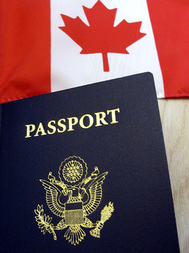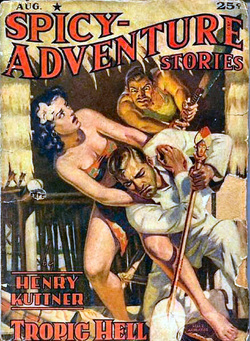
You may think "at the border without a passport" is a cute new way of saying "up the creek without a paddle" or "all dressed up and no place to go," but you'd be wrong.
Last week I was actually at the Canadian border, trying to cross without a valid passport.
Now that I think of it, that is the same thing as being up the creek without a paddle and all dressed up with no place to go.
"How could you have gotten yourself into that unfortunate situation, and what does it have to do with writing?" you may be asking. Or you may be pointing at me and laughing while screeching, "You idiot!" (in which case you would not be alone).
Given those two scenarios, I'm going to choose to believe you are not ridiculing me and calling me names, and I'll tell you the story of how this unfortunate situation came to be. And how it relates to writing. Which it does. I promise.
Last week I was actually at the Canadian border, trying to cross without a valid passport.
Now that I think of it, that is the same thing as being up the creek without a paddle and all dressed up with no place to go.
"How could you have gotten yourself into that unfortunate situation, and what does it have to do with writing?" you may be asking. Or you may be pointing at me and laughing while screeching, "You idiot!" (in which case you would not be alone).
Given those two scenarios, I'm going to choose to believe you are not ridiculing me and calling me names, and I'll tell you the story of how this unfortunate situation came to be. And how it relates to writing. Which it does. I promise.

Once upon a time there was a writer who was also a very busy mom with two children preparing to go to school abroad. In recent weeks this writer-mom spent very little time writing and a whole lot of time ushering her children through the red tape of preparing to live in foreign countries, namely procuring the necessary legal travel documents.
"Make sure you have your passport! You'd better apply for your student visa right now! Has that residence permit come through yet?" she could be heard yelling far and wide. (It was easy to hear her since there was absolutely no sound of tap, tap, tapping of fingers on keyboard to mask her voice.)
She managed to get one son safely off to Sweden, complete with a nearly-impossible-to-obtain residence permit, and was on her way to deposit her second son at his university of choice in Canada, when the unthinkable occurred. While idling in the one-way, there's-no-way-to-exit line at the Peace Arch border crossing, she took out her own passport only to find it had expired. Three months ago. And there's no grace period.
Back in the pre-9/11 days, this wouldn't have been a problem. But now? Problem. Big problem.
In a little aside I'll tell you that this writer-mom is known to her friends and relatives as "the prepared one" (or behind her back: "the over-prepared one"). She's always got a safety pin handy, magically produces an aspirin just when you need it, and can provide a resource, reference, map or guide to anything at the drop of a hat. Her critique group calls her "Kanga" because it's like she always has a big pouch full of all the things you might need in any given circumstance, no matter how unexpected said circumstance might be.
"Make sure you have your passport! You'd better apply for your student visa right now! Has that residence permit come through yet?" she could be heard yelling far and wide. (It was easy to hear her since there was absolutely no sound of tap, tap, tapping of fingers on keyboard to mask her voice.)
She managed to get one son safely off to Sweden, complete with a nearly-impossible-to-obtain residence permit, and was on her way to deposit her second son at his university of choice in Canada, when the unthinkable occurred. While idling in the one-way, there's-no-way-to-exit line at the Peace Arch border crossing, she took out her own passport only to find it had expired. Three months ago. And there's no grace period.
Back in the pre-9/11 days, this wouldn't have been a problem. But now? Problem. Big problem.
In a little aside I'll tell you that this writer-mom is known to her friends and relatives as "the prepared one" (or behind her back: "the over-prepared one"). She's always got a safety pin handy, magically produces an aspirin just when you need it, and can provide a resource, reference, map or guide to anything at the drop of a hat. Her critique group calls her "Kanga" because it's like she always has a big pouch full of all the things you might need in any given circumstance, no matter how unexpected said circumstance might be.

So how, you may be wondering, could Miss Kanga have gotten herself in such a fix at the border? It's not like the trip was unexpected. It's not like she hadn't spent the last two months up to her neck in red tape of the entering-a-foreign-country variety.
The how is actually very simple:
It happened because I was so focused on what everyone else needed, I neglected to make sure I had what I needed.
I mean She. Kanga. The writer-mom.
The how is actually very simple:
It happened because I was so focused on what everyone else needed, I neglected to make sure I had what I needed.
I mean She. Kanga. The writer-mom.
The how of how this relates to writing is three-fold:
1. I neglect my writing because I'm so focused on taking care of other people and obligations. (Too obvious?)
2. Similarly I focus on developing my secondary characters to the neglect of my protagonist. And like me, my protagonist and my writing suffer as a result. (Not as obvious?)
3. I need to scrap the idea I had for a short story about an American citizen getting turned away at the Canadian border due to an expired passport. Because it wouldn't be credible. (Did you see that one coming?)
1. I neglect my writing because I'm so focused on taking care of other people and obligations. (Too obvious?)
2. Similarly I focus on developing my secondary characters to the neglect of my protagonist. And like me, my protagonist and my writing suffer as a result. (Not as obvious?)
3. I need to scrap the idea I had for a short story about an American citizen getting turned away at the Canadian border due to an expired passport. Because it wouldn't be credible. (Did you see that one coming?)

Yes, I crossed that border with the well-wishes of not one but two Canadian border patrol officers who either didn't notice or didn't care that my passport had expired. No one was more surprised than me. I'm soooo glad I did not attempt to sneak across by hiding in the back of the car amidst my son's luggage. I think having to face my sons with an expired passport --after having berated them loudly and endlessly about their travel documents-- is humiliation enough, thank you.
Although a mom smuggling herself across the border in her son's dorm-bound luggage might make a better short story....
Although a mom smuggling herself across the border in her son's dorm-bound luggage might make a better short story....







 RSS Feed
RSS Feed